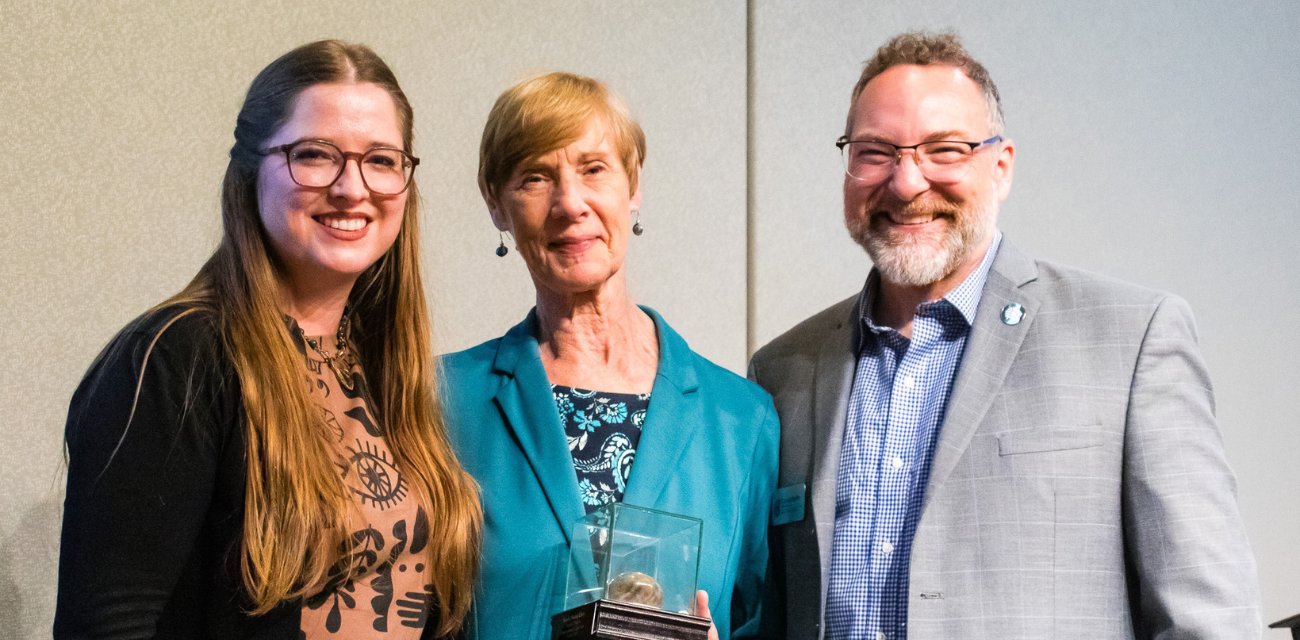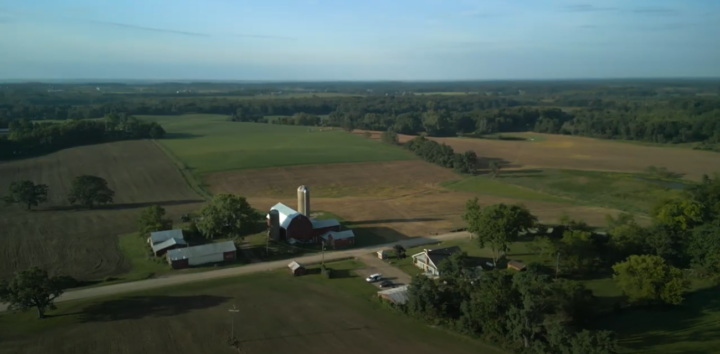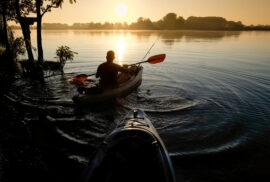Sandy Sorini Elser: 2024 Petoskey Prize winner

Authored by
There’s a big, red barn on Irwin Farm. You can just make out the name of its owners on it, faded by decades of the elements.
Behind the barn is farmland, tilled by the family since the 1830s. Around the crops are the places where the family has hunted, relaxed and walked through: wetlands and forests and a pond.
Sandy Sorini Elser stood in front of the property’s renovated old home outside of Grass Lake. She’s no member of the family. She’s no farmer. But she has helped forever protect the 160 acres of farmland and habitat she stands on.
‘Forever’ is no hyperbole. For years, Sorini Elser has preserved hundreds of acres of natural and agricultural lands in southeast Michigan as a volunteer for the Legacy Land Conservancy. With decades of experience as a municipal and real estate lawyer, she’s helped craft property agreements with the nonprofit and local property owners to keep farmland, rare wildlife, clean water and greenhouse gas-absorbing ecosystems thriving in perpetuity.
“There are people you meet in your life that are true environmentalists and conservationists, and Sandy is one of those,” said Diana Kern, executive director of Legacy Land Conservancy. “She has given a ton of her time in the career that she had and in her volunteer time to make sure the most important land, water, forests and farms are protected for future generations.”
For her selfless work, Sorini Elser received the 2024 Petoskey Prize for Environmental Leadership and a $5,000 check for Legacy Land Conservancy, both presented by the Michigan Environmental Council at its first annual ECOSystems Conference at Crystal Mountain in Thompsonville.
Prosperity at home, in the wild
“I guess it’s kind of selfish,” Sorini Elser said of her environmental motivations. “I live in Ann Arbor, and when I moved here 40 years ago, I… loved when you drove past the [University of Michigan] stadium and then you were out in the country, and there were farms and barns and cows and sheep.
“Selfish” might be a contentious descriptor if you talk to the staff at Legacy Land Conservancy. As Sorini Elser spent her days helping homeowners and homebuilding companies, she also witnessed subdivisions and condominiums being built over that beloved farmland. What was lost was not just local produce, meats and grains. The farms also had forests, grasslands and wetlands. Rivers cut through them and ponds dotted them.
The development dilemma came from necessity. As farmers aged they needed to get their retirement income out of the farm. Selling it made sense.
But there are more ways for retired farmers to make a living, and one such method Sorini Elser knew of were conservation easements. These legal agreements make it so a primary use of a piece of land is to protect the natural features on it. They also provide property owners money through sale and tax benefits.
So, in 2010, Sorini Elser decided to volunteer as a lawyer at the Legacy Land Conservancy, which manages thousands of acres of conservation easements and preserves in Washtenaw, Jackson and Lenawee counties. As she helped build human prosperity in her day job, she helped build natural prosperity after hours.
Property law is complex. Conservation easements especially so. Sorini Elser said mortgages may be outstanding, pipelines and utility lines may run underground, and neighbors may be unintentionally using parts of the land.
For the past 14 years, Sorini Elser has factored these nuances into account, brought various stakeholders together and, with the Legacy Land Conservancy, worked to best protect land and water through legal agreements. She’s even helping the nonprofit take on the properties of a former, nearby conservancy, which has required years of legal acrobatics.
Allene Smith, senior land protection specialist, said Sorini Elser’s hundreds of hours of volunteer service has helped make sure the legal framework Legacy Land Conservancy works from is “evolving intelligently.”
“I can definitely say that I am a better land protection professional because of the privilege of working with Sandy Sorini Elser,” Smith said. “She takes the time to educate, and we can always have confidence that she is approaching any novel or complex… project not just with acumen and creativity but also humor.”

Scenic highways, vibrant greenways
Before Irwin Farm received a conservation easement, Smith helped map out its natural features. What she found was a place of ecological and wildlife diversity that had a kind relationship with the family that owned it.
This became most apparent to Smith in its “remnant” features, or parts of the land that had survived since pre-colonial times.
In the wetlands, which thrive on longevity, the family’s decades of hunting made little impact on the flora and fauna. On the northside of the farm, cows grazed but modestly, allowing native grasses and even the rare prairie fen ecosystem to coexist with what the farmers planted.
What’s more, Irwin farm is part of a 1,300-acre “greenway” of interconnected easements and preserves in Sharon and Sylvan townships.
These features—remnant, interconnected ecosystems—is why the easements Sorini Elser helps create are so important, Smith said. Rare species and habitats are protected, and they are protected across a large swathe of land flora and fauna can migrate around.
“When deciding whether you’re going to purchase a conservation easement on a piece of property, you find out what the species are here,” Sorini Elser said. “That is so exciting to them and to me to find some sort of species in the wetland—are rare kind of bird or animal.”
The careful conservation planning of Legacy Land Conservancy has ripple effects, too. Wetlands absorb pollutants and purify streams. Forests absorb climate change-inducing air pollution. And for folks like Sorini Elser, it can be a simpler pleasure, too: taking in a scenic drive from the city into the country.
Discover
Power environmental change today.
Your gift to the Michigan Environmental Council is a powerful investment in the air we breathe, our water and the places we love.
Sign up for environmental news & stories.
"*" indicates required fields




